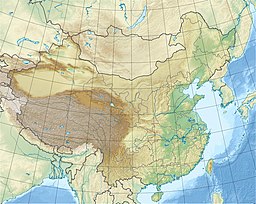Haizi Reservoir
| Haizi Reservoir 海子水库 | |
|---|---|
| Location | on the Ju River[1] |
| Coordinates | 40°10′34″N 117°18′40″E / 40.17611°N 117.31111°E |
| Type | reservoir |
| Basin countries | China |
| Built | 1960[2] |
The Haizi Reservoir (Chinese: 海子水库),[3] also named Jinhai Lake,[4] is a large reservoir[5] located in the east of Haizi Village in Jinhaihu District (formerly Hanzhuang Township), Pinggu District, Beijing,[citation needed] intercepting the Ju River.[6] It is the fourth largest reservoir in Beijing, and is a Class II water source along with the Miyun Reservoir.[7]
It is called "Haizi Reservoir" because it is located in the south of Dajin Mountain and the north of Haizi Village. In 1988, the Reservoir was renamed "Jinhai Lake" and is still in use today.[8]
History[edit]
Haizi Reservoir started construction on 18 November 1959[9] and was completed in July 1960[10] with a total storage capacity of 18.5 million cubic meters, which was expanded in 1968 and 1974 and completed on June 8, 1983.
The reservoir was designed by the Beijing Municipal Design Institute (北京市市政设计院),[11] and the Pinggu County Revolutionary Committee established a project headquarters to organize the construction of migrant workers.[12]
References[edit]
- ^ David Drew (5 October 2017). Karst Hydrogeology and Human Activities: Impacts, Consequences and Implications: IAH International Contributions to Hydrogeology 20. CRC Press. pp. 98–. ISBN 978-1-351-43612-0.
- ^ "Where does Beijing's urban drinking water source come from?". Sohu. Jun 28, 2013.
- ^ "海子水库浮游植物多样性与群落结构特征 (Community structure characteristics of phytoplankton and diversity in the Haizi Reservoir)". China National Knowledge Infrastructure. 2013-10-03. Archived from the original on 2021-02-27.
- ^ "Beijing, Tianjin Locked in Water Dispute". China Daily. 2004-07-27.
- ^ Jingjing Yan (27 August 2014). Comprehensive Evaluation of Effective Biomass Resource Utilization and Optimal Environmental Policies. Springer. pp. 20–. ISBN 978-3-662-44454-2.
- ^ "New fence guards Miyun Reservoir". China Daily. 2018-05-04.
- ^ "Hebei Xinglong piles up 23,000 square meters of garbage in 20 years". The Beijing News. March 22, 2013.
- ^ "Pinggu Jinhai Lake Citizens can overlook by helicopter". Beijing Evening News. Oct 19, 2019.[permanent dead link]
- ^ Gazetteer of Pinggu County. Beijing Publishing House. 2001. pp. 181–.
- ^ Gazetteer of Beijing General Municipal Engineering Design and Research Institute, 1955-1995. China Science and Technology Press. 1999. pp. 193–. ISBN 9787504626097.
- ^ Gazetteer of Beijing. Beijing Publishing House. 2000. pp. 250–. ISBN 9787200041804.
- ^ Chinese Publications Service Center. Chinese Communist Party Important Historical Documents Collection: "Cultural Revolution" Historical Documents and Evaluation Album. Chinese Publications Service Center. pp. 402–.


